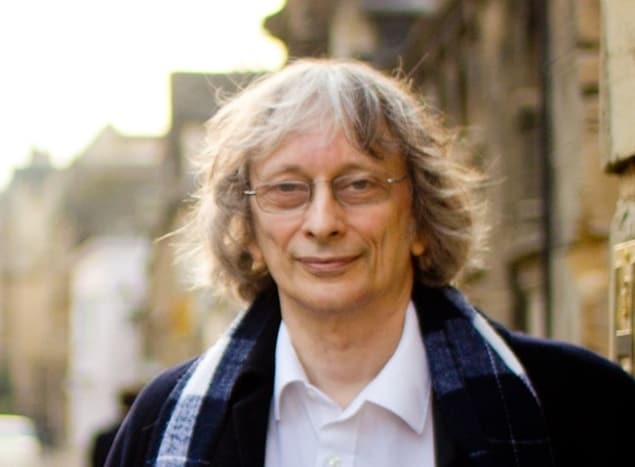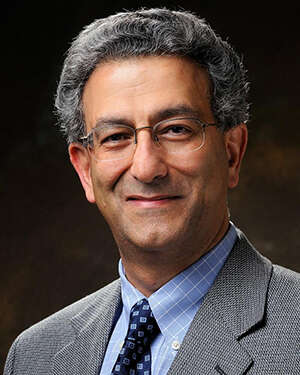Quantum physicist David Deutsch bags Isaac Newton Medal and Prize
30 Nov 2021 Michael Banks
Quantum pioneer: David Deutsch has won the IOP’s 2021 Isaac Newton Medal and Prize (Courtesy: Lulie Tanett)
The quantum physicist David Deutsch has won the 2021 Isaac Newton Medal and Prize for “founding the discipline named quantum computation and establishing quantum computation’s fundamental idea, now known as the ‘qubit’ or quantum bit”. Presented by the Institute of Physics (IOP), which publishes Physics World, the international award is given annually for “world-leading contributions to physics”.
Deutsch’s honour formed part of the IOP’s wider 2021 awards, which recognize everyone from early-career scientists and teachers to technicians and subject specialists. This year saw various changes to the IOP’s awards process, including self-nominations allowed for the first time and greater publicity to encourage a wider pool of applicants. Of those winners who chose to include data about their personal background, some 19% stem from a Black, Asian or minority ethnic group.
Born in Haifa, Israel, Deutsch studied physics at the University of Cambridge before doing a PhD at the University of Oxford. After several years at the University of Texas at Austin, he returned to Oxford, where he is currently based. Deutsch is also a founding member of the university’s Centre for Quantum Computation, which opened in 1998.
Deutsch has been awarded the Newton Medal and Prize thanks to his research in quantum theory. In 1985 Deutsch published his ground-breaking work that detailed the relationship between quantum theory and the universal quantum computer. Four years later he developed the theory of quantum computational gates and networks, which is today the basis of quantum-information science.
In the early 1990s Deutsch proved that a quantum computer would be able to solve problems that require exponentially more computational time on a classical computer due to its restricted modes of computation. His work opened the possibility that the properties of quantum mechanics could have tangible and useful applications in computing. Indeed, today there are several commercial quantum computers being developed by companies and governments worldwide.
The Isaac Newton Medal and Prize attracts an award of £1000 and is the only one of the IOP’s prizes that is open to physicists worldwide. Previous winners include Thomas Kibble, Deborah Jin and Ed Witten.“I am honoured and also very happy that the Institute of Physics recognizes the significance of quantum computation as a fundamental part of physics,” Deutsch told Physics World.
Rewarding excellence
The IOP has announced the winners of its other awards. Among them are Ian Chapman from the UK Atomic Energy Authority who receives the Richard Glazebrook Medal and Prize for outstanding leadership in fusion. “I’m honoured to receive this award on behalf of all the team at UKAEA,” says Chapman. “Realizing fusion energy is one of the biggest scientific and engineering grand challenges, but the rewards for success would be massive.”
Robert Crease from Stony Brook Univeristy in the US, meanwhile, receives the William Thomson, Lord Kelvin Medal and Prize for his 21 years writing Physics World’s Critical Point column, which describes key humanities concepts for scientists, and explains the significance of key scientific ideas for humanities scholars.
The annual IOP awards also recognize early-career scientists. Among them are Ying Lia Li from University College London, who receives the Clifford Paterson Medal and Prize for her work in quantum sensing as well as Rebecca Bowler from the University of Oxford who receives the Henry Moseley Medal and Prize for her research on the first galaxies in the universe.READ MORE
Nader Engheta wins Isaac Newton medal and Prize
“I warmly congratulate all of this year’s award winners. Each and every one of them has made a significant and positive impact in their profession, whether as a researcher, teacher, industrialist, technician or apprentice,” says IOP president Sheila Rowan. “Recent events have underlined the absolute necessity to encourage and reward our scientists and those who teach and encourage future generations. We rely on their dedication and innovation to improve many aspects of the lives of individuals and of our wider society.”
Sarah Bakewell, head of equality, diversity and inclusion at the IOP, says that nominations for next year’s award will be opening soon. “I urge you to have a chat with your teams or speak with your colleagues or even consider nominating yourself for our awards in the future,” adds Bakewell.
The full list of 2021 award winners is available here.
The quantum physicist David Deutsch has won the 2021 Isaac Newton Medal and Prize for “founding the discipline named quantum computation and establishing quantum computation’s fundamental idea, now known as the ‘qubit’ or quantum bit”. Presented by the Institute of Physics (IOP), which publishes Physics World, the international award is given annually for “world-leading contributions to physics”.
Deutsch’s honour formed part of the IOP’s wider 2021 awards, which recognize everyone from early-career scientists and teachers to technicians and subject specialists. This year saw various changes to the IOP’s awards process, including self-nominations allowed for the first time and greater publicity to encourage a wider pool of applicants. Of those winners who chose to include data about their personal background, some 19% stem from a Black, Asian or minority ethnic group.
Born in Haifa, Israel, Deutsch studied physics at the University of Cambridge before doing a PhD at the University of Oxford. After several years at the University of Texas at Austin, he returned to Oxford, where he is currently based. Deutsch is also a founding member of the university’s Centre for Quantum Computation, which opened in 1998.
Deutsch has been awarded the Newton Medal and Prize thanks to his research in quantum theory. In 1985 Deutsch published his ground-breaking work that detailed the relationship between quantum theory and the universal quantum computer. Four years later he developed the theory of quantum computational gates and networks, which is today the basis of quantum-information science.
In the early 1990s Deutsch proved that a quantum computer would be able to solve problems that require exponentially more computational time on a classical computer due to its restricted modes of computation. His work opened the possibility that the properties of quantum mechanics could have tangible and useful applications in computing. Indeed, today there are several commercial quantum computers being developed by companies and governments worldwide.
The Isaac Newton Medal and Prize attracts an award of £1000 and is the only one of the IOP’s prizes that is open to physicists worldwide. Previous winners include Thomas Kibble, Deborah Jin and Ed Witten.“I am honoured and also very happy that the Institute of Physics recognizes the significance of quantum computation as a fundamental part of physics,” Deutsch told Physics World.
Rewarding excellence
The IOP has announced the winners of its other awards. Among them are Ian Chapman from the UK Atomic Energy Authority who receives the Richard Glazebrook Medal and Prize for outstanding leadership in fusion. “I’m honoured to receive this award on behalf of all the team at UKAEA,” says Chapman. “Realizing fusion energy is one of the biggest scientific and engineering grand challenges, but the rewards for success would be massive.”
Robert Crease from Stony Brook Univeristy in the US, meanwhile, receives the William Thomson, Lord Kelvin Medal and Prize for his 21 years writing Physics World’s Critical Point column, which describes key humanities concepts for scientists, and explains the significance of key scientific ideas for humanities scholars.
The annual IOP awards also recognize early-career scientists. Among them are Ying Lia Li from University College London, who receives the Clifford Paterson Medal and Prize for her work in quantum sensing as well as Rebecca Bowler from the University of Oxford who receives the Henry Moseley Medal and Prize for her research on the first galaxies in the universe.READ MORE

Nader Engheta wins Isaac Newton medal and Prize
“I warmly congratulate all of this year’s award winners. Each and every one of them has made a significant and positive impact in their profession, whether as a researcher, teacher, industrialist, technician or apprentice,” says IOP president Sheila Rowan. “Recent events have underlined the absolute necessity to encourage and reward our scientists and those who teach and encourage future generations. We rely on their dedication and innovation to improve many aspects of the lives of individuals and of our wider society.”
Sarah Bakewell, head of equality, diversity and inclusion at the IOP, says that nominations for next year’s award will be opening soon. “I urge you to have a chat with your teams or speak with your colleagues or even consider nominating yourself for our awards in the future,” adds Bakewell.
The full list of 2021 award winners is available here.
from physicsworld.com 17/1/2022
Δεν υπάρχουν σχόλια:
Δημοσίευση σχολίου